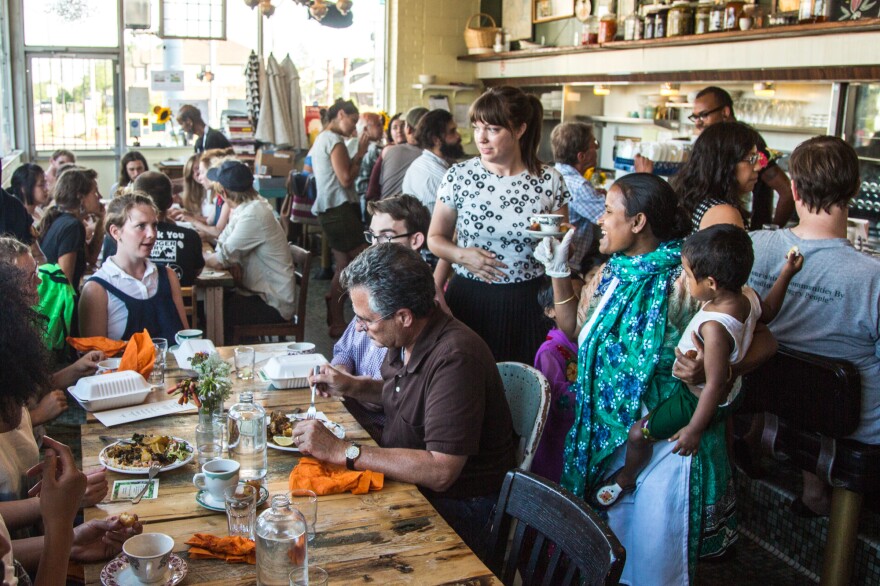One hundred seeds: That's the number Minara Begum needs to plant in her Detroit backyard in order to grow enough vegetables such as squash, taro root and amaranth greens to feed her family for the year.
She learned to cook and garden at a young age in Bangladesh. In the two years since she moved to the U.S., she's grown traditional South Asian crops to feed her family — and whoever visits — on any given day. There's always a pot, or several, on the stove.
For Begum, this is a way of life. But through Bandhu Gardens, in Detroit, Begum and her neighbors are able to leverage their culinary skills into an entrepreneurial venture.
Bandhu Gardens sells surplus vegetables that are grown in the backyards of about six families to a handful of popular area restaurants. Last year they sold 120 pounds of greens, beans and peppers and 25 pounds of squash to restaurant accounts.

The group also holds pop-up dinners to serve traditional Bangladeshi dishes such as halal chicken curry and biryani. It recently added cooking classes to its services, including a recent workshop that featured bitter melon and curried eggs. This year, Bandhu Gardens plans to sell at Eastern Market, the large public farmers market in Detroit.
Now going into its third growing season, the project grew out of the blossoming friendship between Begum and Detroit resident Emily Staugaitis. Begum doesn't speak English and Staugaitis didn't speak Bengali when they first met, though she's since learned enough to communicate. But food helped them overcome that language barrier.
Staugaitis says that the Bangladeshi women in the neighborhood would tell her, "We need work." Meanwhile, people in the restaurant community would say they wanted to use local produce. That got her thinking: "Can I be the matchmaker?"
According to Census figures, Bangladeshi families make up a significant portion of the Asian population in Hamtramck, Mich., which borders the Detroit neighborhood where the Bandhu Gardens founders live. There are nearly 5,000 Asians in the city, with Bangladeshis accounting for 58 percent. Over the past few decades, a large number of immigrants from the Middle East and South Asia (especially Bangladesh) have moved to this part of Detroit and Hamtramck, which is one of the most internationally diverse in Michigan. The Bangladeshi population is so significant that the area on the Hamtramck-Detroit border has been dubbed BanglaTown.
Bringing traditions as well as seeds from their homeland, many families have been gardening for a long time and selling directly to stores and restaurants. But those ventures are led primarily by men in the household, says Staugaitis. She focuses on women who garden specifically for their families, but have extra that would otherwise go to waste.

While the lean operation doesn't make enough money at the moment for the women to make a living, it's enough to make a difference, Staugaitis says. It can help a relative in Bangladesh buy medication or supplement the food budget, Begum adds. A pop-up could net one of the cooks $150 per event.
But the real benefit is intangible. "It gives the ladies some more autonomy over how household decisions are made," says Staugaitis, who recently quit her day job as an assistant curator at an art museum to focus on Bandhu Gardens full time.

It also helps connect the women to resources to which only men have had access. For example, Staugaitis says there's an informal network of light industry jobs for men. It's a network that Begum's husband, Md Abdus Sahid, was able to tap into: He works for an automotive parts manufacturer in the suburbs and participates in a ride-sharing program.
Staugaitis hopes Bandhu Gardens could be that network for new families moving into the neighborhood, not only with help finding economic opportunities but also navigating complicated systems such as health care.
Another goal is to develop more relationships with women-run businesses. A significant portion of the restaurants that Bandhu Gardens supplies are led by women, such as Courtney Henriette, partner in the popular northern Thai restaurant Katoi, which was recently named a James Beard semifinalist for best new restaurant. Katoi, which purchases ingredients such as long beans and greens from Bandhu Gardens, was scheduled to host a Bandhu pop-up dinner on Feb. 26, but the restaurant was ravaged by fire a few days before, and the dinner was relocated to a private residence.
"I'd like to see more of that collaboration happening, especially with a woman and connecting as a woman," says Henriette, noting that while there are top female chefs in the area, there are fewer than male chefs. "For me to be able to work with [Bandhu Gardens] and connect with these women is really powerful."
Another restaurant the group sells to is Rose's Fine Food on the east side of Detroit, where Bandhu Gardens held its first pop-up dinner last summer. Molly Mitchell, who co-owns the diner with her cousin, Lucy de Parry, was moved to see the women "come out of their home kitchens and be in a commercial kitchen ... maybe it hadn't occurred to them to bring it to a commercial sense."
The current dialogue on immigration and the social and political climate have strengthened Bandhu Gardens' resolve. It has "reinforced that this is important work to be doing right now," Staugaitis says, adding, "We will continue to strengthen our relationships within Bandhu Gardens and use it as a platform for other people, such as our dinner guests, to connect with people and cultures they may be unfamiliar with."
Dorothy Hernandez is a journalist based in Detroit.
Copyright 2021 NPR. To see more, visit https://www.npr.org.



